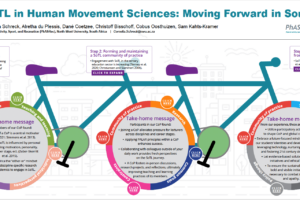ISSOTL 2019 Fellows Spotlight – Anita Acai

Anita Acai
Assistant Professor & Education Scientist
McMaster University
Canada
What drew you to SoTL? My engagement in SoTL began while I was an undergraduate student in biochemistry. I was nearly done with my degree, yet I had grown increasingly uncertain that I would enjoy any of the careers traditionally expected of a biochemistry major. I had always been passionate about teaching and learning-related activities through engagement in various extracurricular activities, so I decided to reach out to a professor who was studying different approaches to teaching biochemistry and nutrition. I had no idea what SoTL was at the time, but this ended up being my first exposure to the field and I loved it! My experience ended up leading me to pursue graduate studies in psychology and health professions education so that I could “marry” my background in science with my passion for education. I kept up my involvement in SoTL as a graduate student and continue to remain engaged in the field now as an assistant professor.
What does being an ISSOTL Fellow mean to you? ISSOTL Fellows come from many different backgrounds and contexts, but something that we have in common is that we are all SoTL leaders. For me, SoTL leaders are those who identify opportunities for change through their own experiences as learners and teachers and work proactively towards finding a solution. The strength I see in this is that leaders aren’t just those who hold formal titles. Anyone who engages in SoTL can exemplify the qualities of a leader, from students to faculty / staff to administrators. It also means that the work we do has a better chance of transforming teaching and learning practices at the ground level since inquiry is rooted in context and practitioners are directly engaged in the change-making process.
What advice would you give to ISSOTL members looking to better engage others in SoTL? It’s important for leaders at multiple levels, including students, faculty / staff, and administrators, to work together in order to create meaningful and sustainable change. One of the most transformative experiences of my career has been the opportunity to work in many nourishing SoTL partnerships, and to engage in the scholarly exploration of what makes this partnership model particularly effective at building institutional capacity for SoTL. These experiences have taught me that it is not only the outputs of SoTL partnerships that matter—the process of partnering and what it can teach us is equally important. The values that underpin partnership, such as respect, reciprocity, and shared responsibility for learning and teaching between students and faculty / staff are ones that I deeply identify with and try to emulate as a leader. Beyond my own development, I also find partnership to be a positive way of helping others grow. I try and enact the principles of partnership even outside of relationships explicitly defined as such; it is the way that I try to mentor and simultaneously learn from those with whom I work as a teacher, researcher, and academic colleague.




